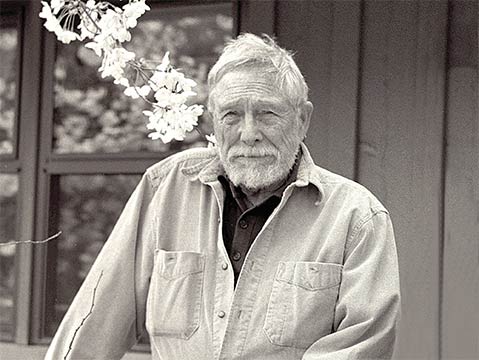A Conversation with Gary Snyder
Pulitzer Prize‒Winning Poet Comes to UCSB

Buddhist, “deep ecologist,” and Pulitzer Prize‒winning poet Gary Snyder is, as Eliot Weinberger wrote in the Paris Review, “a rarity in the United States: an immensely popular poet whose work is taken seriously by other poets.” The Santa Barbara Independent caught up with Snyder over the phone ahead of his Santa Barbara appearance An Evening of Poetry and Conversation, Wednesday, November 4, 8 p.m., at UCSB’s Campbell Hall.
In one of your earlier poems, “Axe Handles,” you quote a folk song in the Shih Jing, the Classic of Poetry: “‘In making the handle / Of an axe / By cutting wood with an axe / The model is indeed near at hand.’” The poems in your new collection, This Present Moment, vary considerably in form from poem to poem. Can you talk a little about how the form of a poem decides itself for you or is decided by some model “near at hand”? I have written several times over the years that my approach to poetic form is to, in part, allow the poem to find its own form. This is of course not entirely literally applied. Most of my poetry is what is sometimes called “open form” poetics, which can include an occasional sestina or rhymed iambic-pentameter couplets. But the truly open-form strategy is one of leaving the colloquial “spoken language” to find a voice which is compressed and lightly musical without calling too much attention to itself and has an energy that carries the narrative devices straight on through. I like strong endings, too — endings which move the whole perspective out to a larger scale.
In “Fixing the System,” you write, “every valve / leaks a little / there is no / stopping the flow.” Do those lines have a larger significance for you? I should ask, “Do they have a larger significance for you?” I simply wrote the poem, but I need not show my hand. As an artist I am setting up little lures or traps and then want to see what gets caught.
Then you’ve caught me! I suppose I was moved to ask the question here because, like William Carlos Williams, you make the rhythms of everyday speech sound magical. I wish I knew how it happens! It doesn’t always.
When that transformation does occur, do you feel it taking place? I do. It’s partly my respect and love and appreciation for ordinary speech that keeps me attuned to those rhythms. I’m not against high-flown literary writing, but in poetry in general, I find poets to be too literate — they sound too much like they’ve been reading other poets’ books.
The penultimate poem in This Present Moment, “Go Now,” describes the death and cremation of your wife in unflinching detail. Then the collection ends with the brief title poem: “This present moment / that lives on / to become / long ago.” That seems like an important pairing. It would be odd if a poet ended a book of poems with a title and a final poem that did not throw light on the whole collection. I will make the point that many people who are perfectly aware that they live in the present moment always — that we are all, always, in the “present moment” — may sometimes overlook that their “long ago” once consisted of present moments. As a position, it is very clearly Buddhist but also just common sense.
Buddhism and common sense are two qualities in your work that I see from the very beginning right up to the new book. As you look back over a lifetime of poetry, how has your work remained consistent, and in what ways do you see it evolving? Early on I was influenced not only by colloquial speech but also classical Chinese poetry. My other poetic influences have been from the classical world, particularly the Greeks and Sanskrit and the vernacular poets of India. I’ve been reading and listening to poetry and prose all my life, and along the way I’ve picked up little pointers and possibilities from lots of other literatures.
4·1·1
An Evening of Poetry and Conversation with Gary Snyder takes place Wednesday, November 4, at 8 p.m. at UCSB’s Campbell Hall. For tickets and more information, call 893-3535 or see artsandlectures.sa.ucsb.edu.



